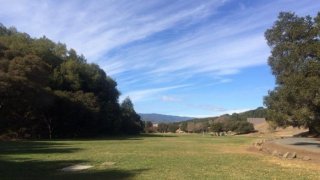
Palo Alto's Foothills Park opened on Thursday to the general public, replacing the decades-old restriction that only allowed residents to visit the park.
Sprawling for 1,400 acres, the park is a natural preserve that provides access to fields, streams, woodlands and panoramic views of the Bay Area.
The city of Palo Alto voted on Nov. 16 to open the park to the public, following a lawsuit in September from the American Civil Liberties Union on behalf of the San Jose/Silicon Valley NAACP, compelling the city to remove the residents-only restriction.
Palo Alto Mayor Adrian Fine tweeted on Thursday that he went for a picnic and walk in the park, and the "residents only" sign was gone. "It's 2020 and I'm really glad Palo Alto could make this move. I'm sorry it took us a lawsuit to get here," Fine said.
He added that he was proud of his hometown, and wanted concerned residents to know that sharing the park does not diminish it. This is the first time in the park's 55-year existence that it will be open to the public, according to the ACLU, which referred to the previous residents-only rule as a "vestige of a well-documented history of racial discrimination."
In the 20th century, Black people were discouraged from purchasing property and living in Palo Alto through practices such as redlining. Consequently, the city's Black population has remained low, just below 2 percent according to census data.
Local
The park opened to residents only in 1965, meaning that only Palo Alto residents - a majority white population - could enter the park, while non-residents could face jail time or up to $1,000 in fines for visiting.
The ACLU's suit claimed that the exclusionary policy infringes on people's freedoms. The city's revised ordinance opening the park allowed it to settle with the ACLU.
However, some residents sought to overturn the rule. In the month following the Nov. 16 vote, a petition to keep the park closed only got about 1,200 of the 2,580 signatures needed to overturn the city's decision. If successful, the petition would have suspended the new ordinance until it could be submitted for a vote at the next general election.
A plaintiff in the suit, LaDoris Cordell, a retired Superior Court judge and former member of the Palo Alto City Council, said in a statement on Wednesday that she was heartened by the city council's decision and glad that the opposing petition did not pass.
"The fact that there weren't 2,500 Palo Altans willing to sign a referendum petition is great news," Cordell said. "It means that, as we come to the close of a very dark year, our community has chosen inclusion over exclusion. I am thrilled to know that the park's entry restrictions are now a thing of the past."
Access to the park is free but only 750 people will be allowed at one time for its first 90 days of opening to the general public. After that, 1,000 visitors would be allowed at a time.
Due to the COVID-19 pandemic, visitors to the park must wear a face covering and practice social distancing. For more information on the park's opening, visit https://www.cityofpaloalto.org/news/displaynews.asp?NewsID=5061.



